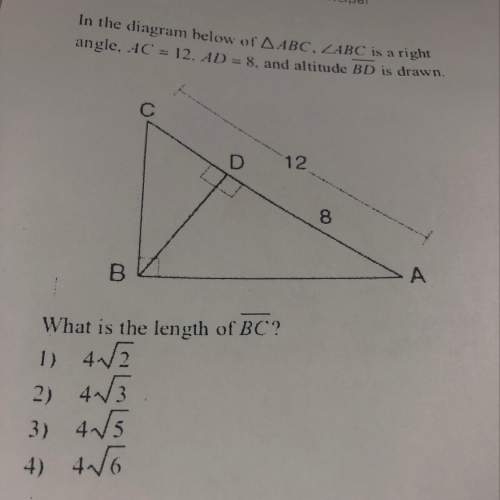
Mathematics, 01.10.2019 13:30 aschool2000
Write a function rule for this arithmetic sequence: 3, 3.25, 3.5, 3.75, … a. a(n) = 3 + (n – 1)(1.25) b. a(n) = 3 + (n – 1)(0.25) c. a(n) = 1 + (n – 1)(0.25) d. a(n) = 3 + n(0.25)

Answers: 1


Another question on Mathematics

Mathematics, 21.06.2019 13:30
If δmtv is reflected across the y-axis, what are the resulting coordinates of point m? a) (-2, 5) b) (-5, 2) c) (5, -2) d) (-2, -5)
Answers: 1

Mathematics, 21.06.2019 19:20
1- what do you think the product of a nonzero rational number and an irrational number is? is it rational or irrational? make use of variables, the closure property of integers, and possibly a proof by contradiction to prove your hypothesis.2- why do we have to specify that the rational number must be nonzero when we determine what the product of a nonzero rational number and an irrational number is? if the rational number were 0, would it give us the same result we found in the first question?
Answers: 2

Mathematics, 21.06.2019 19:30
Write the expression 7x^3-28xy^2 as the product of 3 factors
Answers: 2

Mathematics, 21.06.2019 22:40
Aclassmate thinks that solving a system by graphing gives an exact answer when the lines appear to cross at a grid point, but only an approximate answer when they don't. explain why this isn't true.
Answers: 3
You know the right answer?
Write a function rule for this arithmetic sequence: 3, 3.25, 3.5, 3.75, … a. a(n) = 3 + (n – 1)(1.2...
Questions






Mathematics, 26.11.2019 11:31

Biology, 26.11.2019 11:31



Mathematics, 26.11.2019 11:31

English, 26.11.2019 11:31


Mathematics, 26.11.2019 11:31

Mathematics, 26.11.2019 11:31



Mathematics, 26.11.2019 11:31

Chemistry, 26.11.2019 11:31


Mathematics, 26.11.2019 11:31




